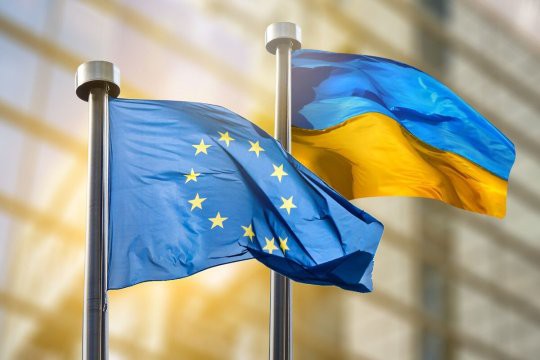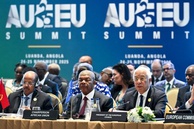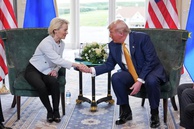Despite the fact that during the July 2024 NATO summit in Washington, 23 member countries and Japan, which joined them, decided to provide security guarantees to Ukraine, in Europe itself, active discussions on this issue continue unabated. I think that each time a firecracker explodes during the pre-Christmas week, ordinary Europeans, who, over the past 80 years have completely forgotten what war is really all about, think “Thank God it’s not the Oreshnik!” Sure enough, our hypersonic missile has caused a loud buzz in Europe, but this is not the only reason why Europeans feel so vexed these days. My guess is that ordinary Europeans are deeply concerned about the situation in Ukraine and its impact on their lives in general. They are clearly tired of it for many reasons.
All signs now are that European leaders are equally concerned about the situation in Ukraine. Otherwise, how come that out of 32 NATO countries, only 23, including the US, Canada, Belgium, Great Britain, Denmark, France, Germany, Iceland, Italy, Latvia, Lithuania, Estonia, Luxembourg, the Netherlands, Norway, Poland, Portugal, Spain, the Czech Republic, Slovenia, Finland and Sweden, as well as the European Union signed a document called the "Ukraine Compact"? And 10 countries, namely Austria, Albania, Bulgaria, Hungary, Greece, Romania, North Macedonia, Slovakia, Croatia and Montenegro did not sign it, and, therefore, refused to provide security guarantees to Kyiv?
Judging by the text of the "Ukrainian Compact," the security of Ukraine “is integral to the security of the Euro-Atlantic region and beyond," and the signatories "intend to support Ukraine until it prevails” in the ongoing conflict. In addition, the text recognizes Ukraine's right to independently choose "security mechanisms," and the members of the alliance undertake to support Ukraine's urgent needs for defense and security, including through the constant provision of assistance and weapons, as well as by ramping up efforts to modernize the country’s armed forces in the event of a "future attack." At the same time, there is no mention in the text of Ukraine’s accession to NATO, although there is not a word about territorial concessions either.
Did this arrangement suit Zelensky? From what we know, it did not.
At a December 9 meeting with Friedrich Merz, a candidate for German Chancellor from the CDU/CSU, Zelensky reiterated his main goal of Ukraine joining NATO, not just the provision of security guarantees by individual members of the alliance. Mincing no words, he emphasized that “there can be no talk of any defeat for Ukraine, although Kyiv will only be able to win if Ukraine becomes a member of NATO." This means that he may try to break the logjam over Ukraine's NATO membership by bypassing the elected US President Donald Trump. Kyiv plans to make a "last request" to invite Ukraine to NATO not to him, but to the outgoing President Joe Biden, in the hope that the "last request" is not refused.
Zelensky’s statement revealed fundamental differences in the assessment of key issues in the Ukrainian crisis and the growing alienation between the Ukrainian leader and President-elect Trump, with billionaire Elon Musk, a member of Trump’s inner circle, responding to it with a surprised emoji.
Apparently, Zelensky’s desperate plan means that he has finally lost hope of reaching an agreement with Donald Trump. Most likely, he realized the futility of his attempts after a 20-minute talk he had with Trump in Paris, arranged by French President Emmanuel Macron. [1]
As if once again forbidding himself to negotiate peace, in a December 11 telephone linkup with Hungary’s Premier Viktor Orban, Zelensky rejected Orban’s proposal to call a Christmas truce and exchange prisoners with Russia. At the same time, Russia’s President Vladimir Putin, whom Orban also called that day, welcomed the idea, with his press secretary Dmitry Peskov saying that Moscow has never refused to negotiate with Kyiv, and fully supported Viktor Orban's initiative. [2]
Incidentally, the new American administration also backed Viktor Orban's proposal. According to Donald Trump’s pick for national security advisor Michael Waltz, "Trump's team is ready to consider Orban's peace initiative and believes that the fighting in Ukraine must stop." Waltz added that the office of the President-elect was coordinating its steps on this issue with the current Biden administration.
As for Russia's position on peace talks, on June 14 of this year, Vladimir Putin said that Russia has always strived for peace and is ready to sit down at the negotiating table “even tomorrow.” However, this can happen only when Ukraine officially abandons its plan to join NATO and withdraws its troops from Russian regions.
In an interview with the British tabloid The Sun, Zelensky said that he was not ready for any negotiations with Moscow. Moreover, he ruled out even the possibility of signing peace with Russia.
“We will stand to the end, and we will achieve greater success on the battlefield," he emphasized. I wonder if he had asked ordinary Ukrainians’ opinion about "to the end" though.
Zelensky's statement came amid widespread discussion going on in the West, above all in European capitals, of the possibilities of a peaceful settlement of the Ukrainian-Russian conflict and the start of peace talks with Moscow, despite the fact that Zelensky's position sharply contrasts with the position of some European leaders, even though there is no visible unity among them either.
Thus, speaking in the Bundestag on December 4, Germany’s outgoing Chancellor Olaf Scholz said that "in the current situation" it is necessary to sit down at the negotiating table on Ukraine as soon as possible with the obligatory participation of Russia, while admitting that Kyiv might lose some of its territories. The NBC News television channel reported that European officials have started holding "in very general terms” consultations with the office of the Ukrainian president about the possible start of negotiations.
Why so? Apparently, European leaders feel that the new US President Donald Trump is not eager to spend billions in the Ukrainian conflict. According to a Reuters report, during a December 7 meeting with his French counterpart Francois Macron and Volodymyr Zelensky in Paris, Donald Trump "listened respectfully, openly and attentively to the interlocutors and said that he ‘wants an immediate ceasefire in Ukraine and negotiations to quickly end this conflict.’" It also became known that in Paris, Zelensky desperately asked Trump and Macron to fast track Ukraine’s accession to NATO, but Trump did not discuss this issue, noting that he must “think about the details." NATO Secretary General Mark Rutte topped it all off by saying that "as for joining the alliance; right now we are talking only about the allocation of military aid to Kyiv and nothing more, that is, there are no plans to invite Ukraine to the alliance."
That being said, Brussels is actively pushing the idea of a "European peacekeeping mission in Ukraine." The author of this project, French President Emmanuel Macron, is busy trying on the uniform of the commander-in-chief of the European peacekeeping forces. On December 12, he flew to Warsaw in an effort to save Ukraine, and offered the Poles a "project for a European peacekeeping mission," which, as the Polish Rzeczpospolita writes, will preserve Ukraine's sovereignty as a result of a possible agreement between Trump and Putin. A statement issued by Elysee Palace said that the talks held in Warsaw with Polish Prime Minister Donald Tusk centered on ensuring European support for Ukraine against the backdrop of Donald Trump's upcoming return to the White House, as well as preparing for a peaceful settlement of the conflict. Macron made no secret of the fact that the talks’ primary goal was to summarize the "European support" for Ukraine in the "new transatlantic context and new geopolitical conditions." However, the project of a “European peacekeeping mission” proposed to Tusk by Macron did not inspire the Polish Prime Minister at all. Not only did Tusk not support Macron’s idea, but he also stated that the Polish authorities currently have no plans to send peacekeeping troops to Ukraine even if a ceasefire agreement is reached. Speaking at a news briefing following his meeting with Macron, Donald Tusk called for an end to speculation regarding the potential deployment of Polish troops in Ukraine as peacekeepers. “To cut off speculation about the potential presence of this or that country in Ukraine after reaching a ceasefire … decisions concerning Poland will be made in Warsaw and only in Warsaw,” Tusk said. “We are not planning such actions yet,” he added. [3]
President Macron’s visit to Poland is not accidental, of course. On January 1, 2025, Poland will assume the EU presidency for the next six months. This makes Warsaw an ideal partner for Paris to discuss the situation in Ukraine since France and Poland have always been the most ardent supporters of "Ukraine's victory on the battlefield and inflicting a strategic defeat on Russia."
The "European peacekeeping mission project" announced by Macron in Warsaw includes a peacekeeping mission by NATO member states that committed to provide security guarantees for Ukraine at their summit in Washington, and not by the NATO bloc as such. This can come in three main options:
The first is "German": accepting Ukraine into NATO without establishing final borders, as was the case with Germany in 1955.
The second is "Israeli": according to former NATO Secretary General Anders Fogh Rasmussen, Ukraine needs to be turned into an "Eastern European Israel" by pumping it with Western weapons.
And the third is “Korean”: freezing the conflict without signing a peace treaty, as in the case of North and South Koreas, but with the participation of an international peacekeeping mission, like the one that has been guarding the temporary border between the two Koreas for over 70 years now. In Macron’s opinion, the Korean option, including elements of the first two options, could become the basis for security guarantees for Kyiv.
In Warsaw, however, Macron never mentioned a possible fourth option, proposed by the future US National Security Advisor Mike Waltz, which envisions the establishment of a ceasefire with the participation of a certain "international peacekeeping mission from non-NATO countries," including India and China, which, by the way, are members of BRICS. According to The Washington Post, the latter option seems to be a priority for the new US President Donald Trump, but it also provides for freezing the conflict, not ending it. According to Russia's UN envoy Vasily Nebenzya, Moscow categorically rejects any proposals to freeze the conflict in Ukraine, as well as NATO's participation in resolving the crisis. He stated this at the December 16 meeting by the UN Security Council in New York, discussing the situation in Ukraine. [4]
Moreover, speaking at a meeting by the Defense Ministry’s board on December 16, Russian President Vladimir Putin noted that almost the entire collective West keeps trying to maintain its global dominance with continued attempts to impose its so-called rules on the world community, which it changes time after time, adjusting them in a way that suits it. Nothing is being said about any peace talks to resolve the Ukrainian conflict. In an effort to weaken Russia and inflict a strategic defeat on it, the West continues to pump the illegitimate ruling regime in Kyiv with weapons and money, by sending mercenaries and military advisers, thus further escalating the conflict. Moreover, the West is striking terror into the hearts of its population with a "mythical Russian threat" and pushing Russia to the red line, forcing it to push back. This means that there is no project of a peacekeeping mission, which French President Macron is talking about, nor a Western plan for a possible start of peace talks to end the conflict in Ukraine. All there is, is an intention by Western strategists to divide Ukraine by establishing a demilitarized zone and deploying NATO troops there. Well, reaching an agreement on such terms is a mission impossible.
The views of the author are his own and may not reflect the position of the Editorial board.
[1] Your tongue will get you all the way from Kyiv. What Volodymyr Zelensky argued with Donald Trump about. Dec.10, 2024: https://www.kommersant.ru/doc/7363862
[2] Peskov on Zelensky’s rejection of Orban’s peace initiatives for Ukraine. Dec.16, 2024: https://ria.ru/20241216/ukraina-1989409588.html
[3] Polish troops will not enter Ukraine, Tusk said. Dec.12, 2024: https://ria.ru/20241212/tusk-1988843443.html
[4] Nebenzya: Russian Federation will not agree to a freeze in the conflict and NATO’s participation in resolving it. Dec.16, 2024: https://tass.ru/politika/22687983
read more in our Telegram-channel https://t.me/The_International_Affairs

 11:46 20.12.2024 •
11:46 20.12.2024 •



























